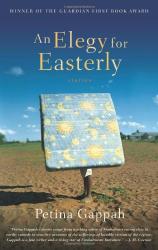Reading Group Guide
Discussion Questions
An Elegy for Easterly: Stories

1. The book’s epigraph, Jane Hirschfield’s “Optimism,” describes the resilient growth that arises in the natural world. What flourishes in the characters’ lives in An Elegy for Easterly?
2. What power does the narrator have in “At the Sound of the Last Post” after her husband has died? With his death, what falsehoods and realities are buried along with him?
3. In the title story, what forms of “currency” sustain Easterly until it is razed? In the eyes of Martha, Josephat, and his wife, what are life’s most valuable commodities?
4. In “The Annex Shuffle,” what sort of healing does Emily experience? How does her sense of reality compare to Ezekiel’s?
5. What aspects of human nature are portrayed in “Something Nice from London”? What determines whether a person will be generous or greedy? How does the narrator reconcile her exasperation with Peter with the technicalities of burying him? How do the characters in this story, and in others throughout the collection, experience the ritual of burial and the power of ancestors?
6. While most of the author’s stories are written in first person or third person narration, “In the Heart of the Golden Triangle” is delivered using the second person “you.” How did this affect your experience?
7. In “The Mupandawana Dancing Champion,” what are the politics of dancing in Vitalis’s world? How is the town of Mupandawana changed by his performance on the dance floor?
8. In “Our Man in Geneva Wins a Million Euros,” what made our man so vulnerable to scams?
9. What does “The Maid from Lalapanzi” illustrate about the disparities between races and classes in Zimbabwe? If SisiBlandina had worked for you, would you have taken her in after she was rejected by her lover?
10. In “Aunt Juliana’s Indian,” what could Robert Mugabe (and other heads of state) learn from Aunt Juliana and her reconciliation with Mr. Vaswani? What was at the heart of their rift?
11. How did you react to the characters’ frequent denial of the AIDS epidemic, portrayed most dramatically in “The Cracked, Pink Lips of Rosie’s Bridegroom”? What cultural factors, in Zimbabwe and elsewhere, determined how AIDS education would be managed?
12. In “My Cousin-Sister Rambanai,” what does a passport mean to Rambanai? Why is her expatriate experience so different from the narrator’s?
13. What was the effect of the shifting points of view in “The Negotiated Settlement”? What character traits are revealed in the way Thulani remembers his wife’s divorce threat (“First you undo me this scar, then we can talk about divorce”) and the way she remembers it (“First you undo me this scar, then you unlearn me this language. After that, you can come back and we can talk about divorce”)? What does language mean to them and to the other characters in this collection?
14. Why is a missing condom the perfect worry for the narrator in “Midnight at the Hotel California”? Does his life as a black-market trader have any redeeming qualities?
15. What are the greatest distinctions between men’s lives and women’s lives in this collection? What fuels the men’s rampant infidelity? How do the women try to obtain freedom?
16. What religious messages are preferred by the characters in An Elegy for Easterly? As an elegy, mourning a loss, what does the book say about the “perished souls” represented by Easterly?
17. Petina Gappah also writes insightful political commentary. What do her fictional characters prove about the realities of life under Robert Mugabe and the legacies of British colonialism? What surprised you the most about the people of Zimbabwe?
An Elegy for Easterly: Stories
- Publication Date: May 26, 2009
- Hardcover: 240 pages
- Publisher: Faber & Faber
- ISBN-10: 0865479062
- ISBN-13: 9780865479067








